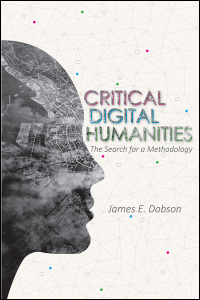Critical digital humanities: the search for a methodology
 Can established humanities methods coexist with computational thinking? It is one of the major questions in humanities research today, as scholars increasingly adopt sophisticated data science for their work.
Can established humanities methods coexist with computational thinking? It is one of the major questions in humanities research today, as scholars increasingly adopt sophisticated data science for their work.
James E. Dobson explores the opportunities and complications faced by humanists in this new era. Though the study and interpretation of texts alongside sophisticated computational tools can serve scholarship, these methods cannot replace existing frameworks. As Dobson shows, ideas of scientific validity cannot easily be–nor should be–adapted for humanities research because digital humanities, unlike science, lack a leading-edge horizon charting the frontiers of inquiry. Instead, the methods of digital humanities require a constant rereading. At the same time, suspicious and critical readings of digital methodologies make it unwise for scholars to defer to computational methods. Humanists must examine the tools–including the assumptions that went into the codes and algorithms–and questions surrounding their own use of digital technology in research.
Insightful and forward thinking, Critical Digital Humanities lays out a new path of humanistic inquiry that merges critical theory and computational science.
zum Buch – gedruckt & elektronisch – in disco
zum Buch auf der Verlags-Website
Der Autor James E. Dobson ist unter @jeddobson auf Twitter aktiv.
Geschichte digital Schreiben: Hypertext als non-lineare Wissensrepräsentation in der Digital History
 Geschichte als nicht-linearen Verlauf aufzufassen heißt, historische Zusammenhänge in all ihrer Komplexität auszudrücken. Dabei stoßen wir mit gedruckten Texten an Grenzen. Christian Wachter zeigt: Digitaler Hypertext hingegen erweist sich als konstruktive Erweiterung für die Erkenntnisvermittlung – non-linear gedachte Zusammenhänge werden mit einem non-linearen Medium explizit repräsentiert. Entgegen einem netzwerkartigen Schreiben drängen sich multilinear angelegte und visualisierte Erzählpfade auf, die den narrativen und argumentativen Aufbau der Wissensangebote abbilden. Sie vermitteln dadurch epistemisch Wesentliches.
Geschichte als nicht-linearen Verlauf aufzufassen heißt, historische Zusammenhänge in all ihrer Komplexität auszudrücken. Dabei stoßen wir mit gedruckten Texten an Grenzen. Christian Wachter zeigt: Digitaler Hypertext hingegen erweist sich als konstruktive Erweiterung für die Erkenntnisvermittlung – non-linear gedachte Zusammenhänge werden mit einem non-linearen Medium explizit repräsentiert. Entgegen einem netzwerkartigen Schreiben drängen sich multilinear angelegte und visualisierte Erzählpfade auf, die den narrativen und argumentativen Aufbau der Wissensangebote abbilden. Sie vermitteln dadurch epistemisch Wesentliches.
zum Buch – gedruckt & elektronisch – in disco
zum Buch auf der Verlags-Website
Der Autor Christian Wächter ist unter @ChrWachter auf Twitter aktiv.
Weitere Titel zu den Digital Humanities finden Sie z.B. über eine Suche in disco.
